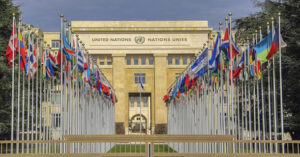 During the ongoing 50th United Nations Human Rights (UNHR) Council, 47 member states voiced concern about China’s human rights abuses, asking for meaningful and unhindered access. The joint statement by the concerned nations highlights the systematic violations of human rights by China, in particular in Tibet, East Turkestan [Ch: Xinjiang] and Hong Kong. “The states continue to be gravely concerned about the deterioration of respect for human rights and fundamental freedoms in Hong Kong and the human rights situation in Tibet”, reads the statement that was delivered by The Netherlands on behalf of the 47 countries.
During the ongoing 50th United Nations Human Rights (UNHR) Council, 47 member states voiced concern about China’s human rights abuses, asking for meaningful and unhindered access. The joint statement by the concerned nations highlights the systematic violations of human rights by China, in particular in Tibet, East Turkestan [Ch: Xinjiang] and Hong Kong. “The states continue to be gravely concerned about the deterioration of respect for human rights and fundamental freedoms in Hong Kong and the human rights situation in Tibet”, reads the statement that was delivered by The Netherlands on behalf of the 47 countries.
The joint statement has also asked China to ensure full compliance with the obligations under national and international law with regard to the protection of human rights, and to ratify the International Covenant on Civil and Political Rights.
Prior to the UNHR meeting, a panel of over 40 UN experts also called upon the Chinese government to cooperate with the UN human rights system and to provide access to independent experts to report on the treatment of ethnic minorities in Xinjiang and Tibet.
According to the statement released by the Office of the High Commissioner, UNHR, the experts said that it is critical to strengthen cooperation with independent human rights experts and Human Rights Council processes in order for China’s human rights commitments to be fully enforced.
The experts stressed the urgent need for a complete assessment of the human rights violations in the country, especially in the Xinjiang Uyghur Autonomous Region, the Tibet Autonomous Region and in the Hong Kong Special Administrative Region.
Responding to the joint statement by 47 countries that raised concern, China is claiming that as many as 69 countries are supporting its own call to the UN to stop discussions of the country’s human rights atrocities, reported the Tibetan Review. In the pro-China joint statement, Cuba, on behalf of the 69 countries said, “Issues concerning Xinjiang, Hong Kong and Tibet are China’s internal affairs and brooks no interference.” The joint statement further read, “We oppose politicisation of human rights and double standards, or interference in China’s internal affairs under the pretext of human rights.”




 Print
Print Email
Email